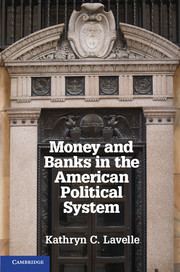Book contents
- Frontmatter
- Contents
- Figures and Tables
- Preface
- Acknowledgments
- Abbreviations
- 1 The Institutional Foundations of Financial Politics in the United States
- Section 1 A Historical Background
- Section 2 Bureaucratic Politics and Finance
- Section 3 The Operation of the Financial Political Economy
- 7 The Process in Motion
- 8 The Process Approaches Collapse
- 9 The Process in Its International Context
- Section 4 Conclusions
- Glossary
- References
- Index
- References
9 - The Process in Its International Context
Politics in International Institutions
Published online by Cambridge University Press: 05 January 2013
- Frontmatter
- Contents
- Figures and Tables
- Preface
- Acknowledgments
- Abbreviations
- 1 The Institutional Foundations of Financial Politics in the United States
- Section 1 A Historical Background
- Section 2 Bureaucratic Politics and Finance
- Section 3 The Operation of the Financial Political Economy
- 7 The Process in Motion
- 8 The Process Approaches Collapse
- 9 The Process in Its International Context
- Section 4 Conclusions
- Glossary
- References
- Index
- References
Summary
The financial political economy operates in the context of national and international institutional arrangements. Hence, monetary, fiscal, and regulatory financial policies respond to shocks from within the country, as well as to what happens outside of it, during the course of the business cycle and during a crisis. As with the national economy, developments in the international political economy compel citizens and bankers to demand change, and for the U.S. government to respond.
This chapter explores the connections between international monetary and financial arrangements to the organizations of the federal government that we have seen thus far. Thus the chapter introduces a wide range of international institutions into our consideration of the domestic monetary, fiscal, and regulatory policy domains. For political scientists who study international relations, institutions are not just formal bodies such as Congress or the Department of the Treasury. They are all of the administrative agencies, laws, norms, and operating procedures that mediate policy outcomes. Therefore, they can be formal, with a building, rules, and procedures, or informal, insofar as they constitute a set of principles that specify appropriate conduct for a class of state actions. The upshot is that all political institutions of the international financial system do not have the same status in international law, or the same effect on the functioning of the domestic economies of states. At present, there is no formal international monetary system outside of regional arrangements like the eurozone, albeit there have been formal arrangements in the past.
- Type
- Chapter
- Information
- Money and Banks in the American Political System , pp. 219 - 246Publisher: Cambridge University PressPrint publication year: 2013



